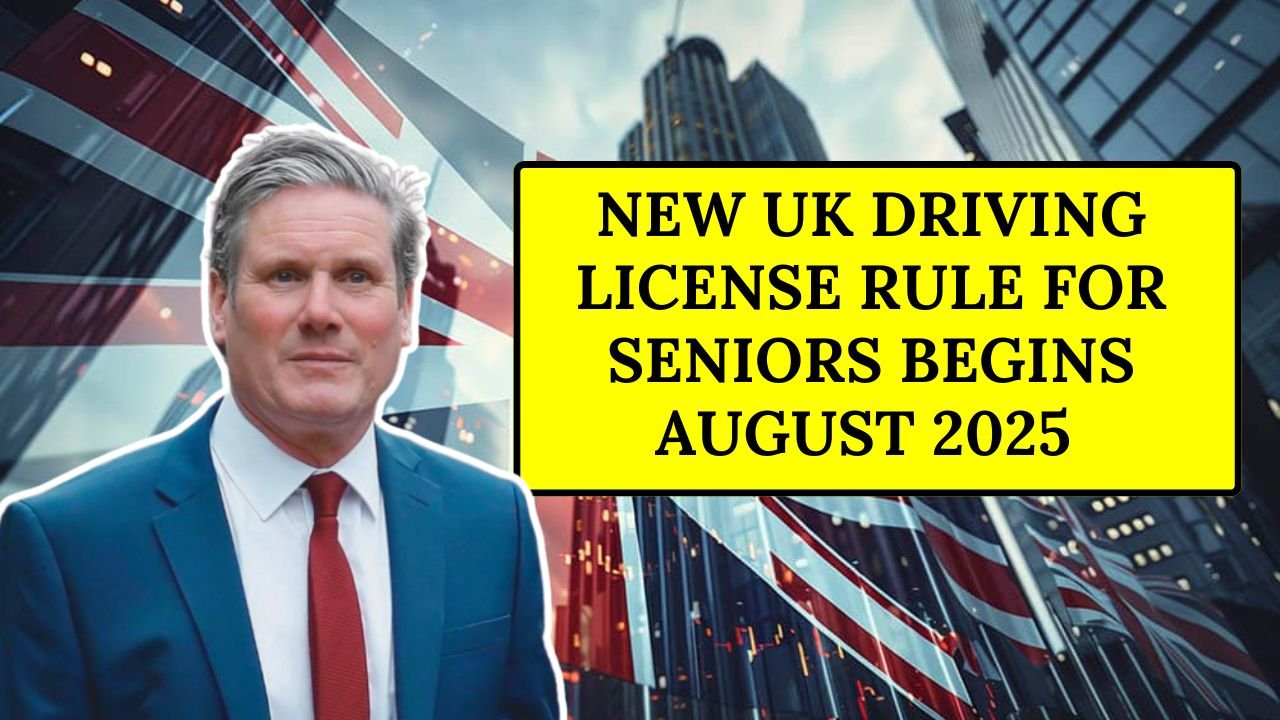The New UK Driving License Rule for Seniors is more than just a change in paperwork — it’s a major shift in how older drivers will be allowed to stay on the road. With the rule officially kicking in by August 2025, drivers aged 70 and over are being urged to pay close attention to what’s coming. Whether you’re a senior driver yourself or concerned about an aging loved one, this rule could affect how freely and legally one can continue to drive.
In this guide, we’ll break down what the New UK Driving License Rule for Seniors actually means, who it affects most, and how you or your family members can stay prepared. From vision tests to possible medical assessments, these changes are shaping up to be the most significant in decades.
What to Know About the New UK Driving License Rule for Seniors
The government is pushing this update as part of its wider initiative to improve road safety across the UK. With an ageing population, there are now more senior drivers on the road than ever before. That also means a higher chance of age-related health issues that could impact driving ability. As part of the New UK Driving License Rule for Seniors, the DVLA plans to tighten renewal requirements for drivers aged 70 and above—particularly those with medical concerns. Proposed changes may include mandatory GP certification, cognitive testing, and shorter renewal periods. The goal isn’t to penalise seniors, but to ensure that everyone behind the wheel is safe and capable.
The Rules Right Now
Currently, when a UK driver turns 70, they are required to renew their license every three years. The renewal process is pretty straightforward — a self-assessment that confirms the driver meets vision requirements and doesn’t have any medical condition that could affect their driving. There’s no need for a doctor’s note, driving test, or even a physical checkup unless something is declared voluntarily.
This self-reporting system has worked for years, but with the rise in age-related conditions, experts argue it might not go far enough to ensure safety for everyone on the road.
What’s Changing from August 2025?
The DVLA has announced upcoming changes, although the full rulebook hasn’t been released yet. Here’s what’s expected under the New UK Driving License Rule for Seniors:
| Possible New Measure | Who It Could Affect |
| Mandatory GP or optometrist certification | Drivers with reported medical or vision issues |
| Shorter renewal periods (e.g. every 2 years) | Those with higher health risks |
| Cognitive reaction time tests | Drivers with suspected memory or neurological problems |
| On-road driving assessments | Only in flagged cases |
The new requirements are tailored toward identifying real risks, not assuming someone is unfit based on age alone. That means most healthy drivers won’t notice a major difference in their renewal experience — but those with certain conditions might face extra steps.
Who Might Face Extra Scrutiny?
This isn’t about banning all elderly drivers from the road. In fact, many seniors are safer and more cautious than their younger counterparts. However, the DVLA will likely tighten its approach to individuals with certain flagged health issues.
Drivers may be subject to further reviews if they have:
- Ongoing or worsening vision problems
- Cognitive disorders like dementia or Parkinson’s
- Cardiovascular conditions like arrhythmias
- A history of blackouts, fainting, or seizures
These medical flags can already trigger DVLA investigations, but the New UK Driving License Rule for Seniors aims to standardize how such cases are reviewed and followed up.
Why Now?
The numbers explain it. In 1990, there were about 5 million people aged 70 and over in the UK. In 2025, that figure is expected to exceed 10 million. Seniors are not just living longer — they’re staying mobile longer too. As roads become more congested and cities grow busier, the government is taking steps to adapt driving laws to meet modern needs.
The intent is to ensure that every driver, regardless of age, can respond quickly, see clearly, and make sound decisions behind the wheel.
The Critics’ Corner
Not everyone is on board. Critics argue that these changes risk painting all seniors with the same brush. Some say the focus should be on actual driving performance — not assumptions based on age. There’s also concern in rural communities, where losing a license might mean losing access to basic services or social interaction.
However, safety experts argue that earlier intervention through health screenings may allow for more options — such as conditional licenses or limited driving zones — rather than total restrictions.
How Families Can Help
If you have a parent or grandparent still driving, this is a great time to start the conversation. Don’t make it confrontational — no one wants to feel like they’re losing their independence.
Instead, try this:
- Offer to schedule vision or hearing tests
- Suggest going for a ride together to observe their driving
- Talk about backup transport options like community shuttles or family support
- Help them navigate the DVLA renewal process when the new rule takes effect
Remember, the goal is safety, not punishment.
Fact Check
As of mid-2025, no final policy mandates that all seniors take a driving test or submit a doctor’s certificate. But it’s likely that changes will apply more strictly to individuals with disclosed or suspected health concerns. Keep an eye on gov.uk for the official update closer to the August rollout.
FAQs
Is whey or plant protein better for muscle growth?
This question seems unrelated to the topic. For muscle growth, both are effective, but whey has a slight edge in rapid absorption.
Will all drivers over 70 be retested?
No. Only those flagged for medical or cognitive concerns may face additional assessments.
Will my GP automatically report me to the DVLA?
Only if they believe your condition poses a safety risk while driving.
Can I appeal if the DVLA suspends my license?
Yes, there is a formal process you can follow to contest any DVLA decision.
Is this a permanent rule or a trial?
The rule is expected to become permanent starting August 2025, depending on its implementation success.
Final Thought
The New UK Driving License Rule for Seniors isn’t about taking freedom away — it’s about making sure drivers are safe, responsible, and healthy behind the wheel. For many seniors, very little will change. But if you or someone you love has ongoing health conditions, it’s best to be proactive now.
Have thoughts about the rule? Drop a comment below and explore more content to stay updated on changes that may impact you or your loved ones.












